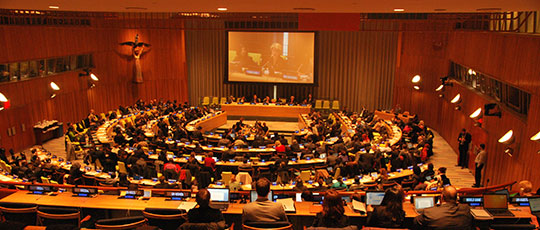Sustainable Development Goals
"Losing biodiversity erodes basis for sustainable development"
Clear message from side event to the UN Open Working Group on Sustainable Development Goals
- About 60 stakeholders from 18 countries, representing governments, UN organisations, science and civil society, met in Medellín, Colombia
- Dialogue was organised by the centre, the Alexander von Humboldt Institute and the Ministry of Environment and Sustainable Development of Colombia
- Conclusion: biodiversity should be integrated in all the Sustainable Development Goals and become a goal in its own right
"Life on Earth, in all its diversity, shapes the environmental, social and economic processes and resources that are ultimately key to human well-being and achieving all Sustainable Development Goals. Losing biodiversity erodes the basis for sustainable development by undermining ecosystem services and social and ecological resilience, which reduces the capacity for adaptive responses in a rapidly changing world. Biodiversity should thus be integrated in all the Sustainable Development Goals and become a goal in its own right”.
This key message from the recent multi-stakeholder dialogue that took place in Medellín, Colombia, 2-4 December 2013, was conveyed at a side event to the 8th meeting of the General Assembly UN Open Working Group on Sustainable Development Goals (SDGs), February 3, in New York.
The side event was convened by the Environment Ministries of Sweden and Colombia. The Swedish Environment Ambassador Annika Markovic chaired the meeting, and Paula Caballero, Director of Economic, Social and Environmental Affairs at the Ministry of Foreign Affairs, Colombia, gave welcoming remarks.
Centre director and Dialogue co-chair Johan Rockström presented in a ten-minute video the key message from the dialogue and explained the science behind it (see video above). The message was then elaborated and complemented by a panel of speakers, consisting of Dialogue co-chair Brigitte Baptiste, General Director of the Alexander von Humboldt Institute, Alejandra Torres, Director of International Affairs, Ministry of Environment and Sustainable Development, Colombia, and Fred Boltz, Managing Director, Rockefeller Foundation. All panelists, as well as the conveners, expressed their strong support for integrating biodiversity into all the SDGs.
The co-chairs' report from the Multi-stakeholder Dialogue was shared with delegates attending the side event, and a policy brief was distributed to all 90 country representatives in the UN Open Working Group on SDGs.
About the dialogue
On 2-4 December 2013 about 60 stakeholders from 18 countries – representing government organisations, UN organisations, science and civil society – met in Medellín, Colombia, to discuss how social-ecological resilience might be integrated into the Sustainable Development Goals (SDGs) and the Post-2015 Agenda.
This dialogue, entitled Multi-stakeholder Dialogue on Integrating Social-Ecological Resilience into the New Development Agenda,was organised jointly by the centre, the Alexander von Humboldt Institute for Research on Biological Resources, the Ministry of Environment and Sustainable Development of Colombia, with the full support of the Governments of Colombia and Sweden, and in consultation with the Secretariat of the Convention on Biological Diversity.
The aim of the dialogue was to explore different ways to integrate social-ecological resilience, underpinned by biodiversity and ecosystem services, into future development goals and monitoring frameworks.
"By gathering different perspectives and experiences from a variety of actors we wanted to broaden and enhance the understanding of biodiversity not as a problem to solve, as it is often perceived, but as an important opportunity and solution for sustainable development, including poverty eradication and social-ecological resilience," says Ellika Hermansson Török, dialogue project leader at SwedBio.

8th meeting of the UN Open Working Group on Sustainable Development Goals. Photo: E. Hermansson Török







